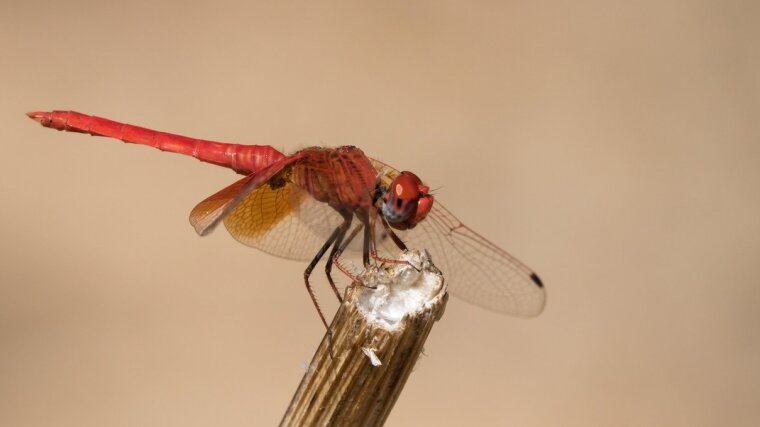

-
Research interests
I am an evolutionary biologist and passionate naturalist with a particular interest in microevolution. Microevolution is focused on evolutionary change that takes place within populations and that ultimately lead to divergence between populations. I make use of quantitative genetic techniques for studying the genetic architecture of sexually selected traits and of molecular markers for localizing additive genetic variation in the genome ('QTL mapping'). Two particularly intriguing topics are the evolution of sexual ornamentation and of behavioral strategies for successful reproduction. Another special focus lies on the sources of variation in mating preferences, an important component of sexual selection. Other interests include life history evolution, inbreeding depression, condition-dependent trait expression, biostatistics and animal migration.
-
Current projects
Learn moreWe are working with the club-legged grasshopper (Gomphocerus sibiricus) as a novel model system for studying the evolution of sexually selected traits. The species is remarkable for its sexually dimorphic ornament: males possess swollen front legs ('Popeye arms') that are presented to the females during display. The system is amenable to laboratory and field work, which offers great opportunities for testing results from the lab in the natural environment. Another key advantage is that the species allows studies within populations as well as between populations/subspecies. The main aim of my work is to understand the coevolution and conflict between the sexes using quantitative genetic and genomic tools. By doing so, I am addressing fundamental evolutionary questions such as the evolution of sexual signals and the evolutionary dynamics of indirect genetic effects.
-
Recent publications
Learn moreVarma, M., Winter, G., Ebeling, A., Lehmann, A., Cabon, L., Palacios-Gimenez, O.M., Pratap, N. & Schielzeth, H. (2025). Few genetic loci control the green-brown color polymorphism in the meadow grasshopper Pseudochorthippus parallelus. Journal of Evolutionary Biology doi: 10.1093/jeb/voaf036 doi: 10.1093/jeb/voaf036External link
Winter, G. & Schielzeth, H. (2025). Genetic and habitat complexity effects on unpredictability in escape behavior of a grasshopper species. Journal of Evolutionary Biology doi: 10.1093/jeb/voaf030External link
McCune, K.B., Williams, C., Dochtermann, N.A., Schielzeth, H. & Nakagawa, S. (2025). Repeatability and intra-class correlations from time-to-event data: towards a standardized approach. Animal Behaviour doi: 10.1016/j.anbehav.2025.123102External link
Palacios-Gimenez, O.M., Castillo, E.R.D. & Schielzeth, H. (2025). Karyotype evolution and speciation in Orthoptera. Journal of Evolutionary Biology doi: 10.1093/jeb/voaf018External link
Winter, G. & Schielzeth, H. (2024). Ontogeny of unpredictability in escape behaviour of a grasshopper species. Animal Behaviour doi: 10.1016/j.anbehav.2024.11.007External link
Jayaprasad, S., Peona, V., Ellerstrand, S.J., Rossini, R., Bunikis, I., Pettersson, O.V., Olsen, R.-A., Rubin, C.-J., Einarsdottir, E., Bonath, F., Bradford, T.M., Cooper, S.J.B., Hansson, B., Suh, A., Kawakami, T., Schielzeth, H. & Palacios-Gimenez, O.M. (2024). Orthopteran neo-sex chromosomes reveal dynamics of recombination suppression and evolution of supergenes. Molecular Ecology doi: 10.1111/mec.17567External link
Eisenhauer, N., Mueller, K., Ebeling, A., Gleixner, G., Huang, Y.Y., Madaj, A.M., Roscher, C., Weigelt, A., Bahn, M., Bonkowski, M., Brose, U., Cesarz, S., Feilhauer, H., Guimaraes-Steinicke, C., Heintz-Buschart, A., Hines, J., Lange, M., Meyer, S.T., Mohanbabu, N., Mommer, L., Neuhauser, S., Oelmann, Y., Rahmanian, S., Sasaki, T., Scheu, S., Schielzeth, H., Schmid, B., Schloter, M., Schulz, S., Unsicker, S.B., Vogel, C., Weisser, W.W. & Isbell, F. (2024). The multiple-mechanisms hypothesis of biodiversity-stability relationships. Basic and Applied Ecology 79: 153-166. doi: 10.1016/j.baae.2024.07.004External link
Huang, Y., Stein, G., Kolle, O., Kübler, K., Schulze, E.-D., Dong, H., Eichenberg, D., Gleixner, G., Hildebrandt, A., Lange, M., Roscher, C., Schielzeth, H., Schmid, B., Weigelt , A., Weisser, W.W., Shadaydeh, M., Denzler, J., Ebeling, A. & Eisenhauer, N. (2023). Enhanced stability of grassland soil temperature by plant diversity. Nature Geoscience doi: 10.1038/s41561-023-01338-5External link
Varma, M., Winter, G., Rowland, H.M. & Schielzeth, H. (2023). Ontogeny of color development in two green-brown polymorphic grasshopper species. Ecology and Evolution doi: 10.1002/ece3.10712External link
Argens, L., Weisser, W.W., Ebeling, A., Eisenhauer, N., Lange, M., Oelmann, Y., Roscher, C., Schielzeth, H., Schmid, B., Wilcke, W. & Meyer, S.T. (2023). Relationships between ecosystem functions vary among years and plots and are driven by plant species richness. Oikos doi: 10.1111/oik.10096External link
Mutwill, A.M., Schielzeth, H., Richter, S.H., Kaiser, S. & Sachser, N. (2023). Conditional on the social environment? Roots of repeatability in hormone concentrations. Hormones and Behavior doi: 10.1016/j.yhbeh.2023.105423External link
Pick, J.L., Kasper, C., Allegue, H., Dingemanse, N., Dochtermann, N.A., Laskowski, K.L., Lima, M.R., Schielzeth, H., Westneat, D.F., Wright, J. & Araya-Ajoy, Y.G. (2023). Describing posterior distributions of variance components: Problems and the use of null distributions to aid interpretation. Methods in Ecology and Evolution (in press) doi: 10.1111/2041-210X.14200External link
Singh, P., Wolthaus, J., Schielzeth, H. & Müller, C. (2023). State-dependency of behavioural traits is a function of the life-stage in a holometabolous insect. Animal Behaviour 203: 29-39. doi: 10.1016/j.anbehav.2023.06.013External link
Winter, G., Wirsching, L. & Schielzeth, H. (2023). Condition-dependence of (un)predictability in escape behavior of a grasshopper species. Behavioral Ecology doi: 10.1093/beheco/arad047External link [Data availability]External link [Code availability]External link